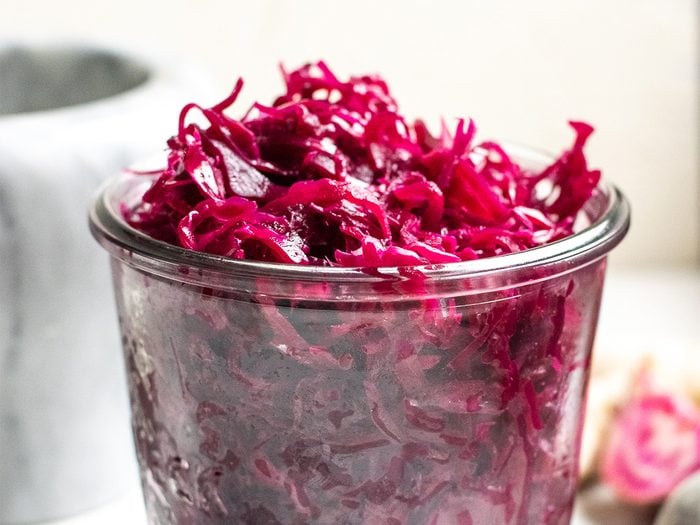A Simple Recipe for Beet Sauerkraut That’s Good for Your Gut

Looking to improve your digestion? Sauerkraut is a delicious (and natural) way to boost your probiotic intake.
Pair this crispy cabbage and beet sauerkraut with pork dishes, potato salad, or use it as a way to elevate your favourite sandwich.
(Related: A Beginner’s Guide to Making Fermented Foods)
Beet Sauerkraut
Makes 4 cups
Prep Time: 10 minutes
Total Time: 5 days
Ingredients
- 1 small red cabbage, cored and very thinly sliced
- 1 cup grated beets (about 2 medium)
- Kosher or sea salt
- 1 Tbsp grated ginger
- 2 cloves garlic, grated
- 2 clean glass jars
Directions
1. Add shredded cabbage and grated beets to a large bowl. Take total weight of the vegetables in grams and multiply by 0.02. Add this amount in grams of salt. Massage cabbage and beets until they soften and begin to release water (about 5 minutes). Stir in grated ginger and garlic.
2. Let sit for 1 hour, stirring occasionally to allow vegetables to release more water. Transfer vegetables and their juices into clean jars, packing down and leaving a 2- to 3-inch space at the top. Vegetables should be submerged in their liquid. If there’s not enough liquid to cover, mix 1 teaspoon salt with 1 cup water and pour over top until covered.
3. Fill a small plastic bag about one-third of the way with water, seal, and place at the top of the jar to weigh down the sauerkraut until it is fully covered in liquid. Loosely attach the jar lid, then repeat with the second jar. Place jars on a sheet pan, cover with a dish cloth and allow to sit in a cool place for 4 to 5 days to ferment. When you tap the jar, tiny bubbles should rise to the top, and you’ll know it’s ready. Taste and leave for 1 to 2 more days if you’d like a stronger flavour.
4. Once vegetables are fermented to taste, remove the plastic bag, secure the jar lids and transfer to the fridge. Sauerkraut will keep there for up to 1 month.
Tip: It’s important to measure the salt by weight for this recipe (2 percent of the vegetables’ total weight). Too much salt can inhibit fermentation, and too little can lead to harmful bacteria growth.




